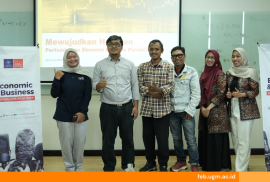Last Thursday (3/5), Faculty of Economics and Business UGM held Mubyarto Public Policy Forum. This forum had been already held for the second time. Prof. Dr. Mubyarto is used as the name of this series as an appreciation of his merit in rural economics. In this public policy forum, FEB UGM was cooperated with Australia National University (AUN) Indonesia Project.
This forum was opened by Eko Suwardi, M.Sc., Ph.D. as the Dean of FEB UGM. The speakers in this forum are Prof. Sri Adiningsih, Ph.D. as Head of Dewan Pertimbangan Presiden (Wantimpres); Prof. Armida Alisjahbana, Ph.D. as Director of SDGs Center Universitas Padjajaran; Prof. Fukunari Kimura, Ph.D. as Chief Economist of ERIA Jakarta; and Denni Puspa Purbasari, Ph.D. selaku Deputy III of President Staff Office (KSP).
In these last few years, the economic development in Indonesia has successfully decreased the unemployment rate, poverty rate, and the community discrepancy especially in rural area. Nevertheless, the government is still attempting to improve the development in rural area. This issue was stated in the government’s Nawacita which was delivered by Sri Adiningsih, specifically developing Indonesia especially in the rural/underdeveloped, improving the quality of human life, increasing productivity and international competitiveness, and accelerating domestic economic development.
In this technological era, participations from all parties including society and government through digital economy are necessary to help alleviating poverty and society discrepancy in rural area. Armida Alisjahbana said that the development of human capital is important to help the nation to solve the problems aligned with Sustainable Development Goals (SDGs) by United Nations. Some goals that are emphasized by Armida are no poverty, zero hunger, good health and well-being, and quality of education.
“The government is still undertaking to society empowerment. We have a huge potential to grow rapidly. Therefore, we need the supports from all layers of society. The millenials can also actively participate through digital economy.” said Sri.
Prof. Fukunari in his presentation said that the technological breakthroughs have changed the international division of labor. Prof. Fukunari explained that there are four regimes of unbundlings, they are pre-globalized world with the focus of subsistence agriculture, the 1st unbundling with the focus of mining and labor-intensive manufacturing, the 2nd unbundling with the focus of machinery industries, and the 3rd unbundling with the focus of digital economy utilizing advance information and communication technology.
Denni began her session by explaining the development of GDP and its formation components. She emphasized that competitiveness is the prerequisite to sustainable development. The key of competitiveness is the efficiency as well as innovation. Then the key of efficiency and innovation is human resource. Other than that, infrastructure development and institution also needs competent human resources and their integrity.
Sumber: Mahsa Edgina I.E. (Acha)




